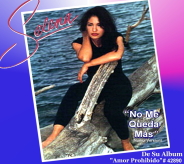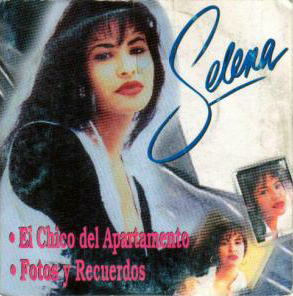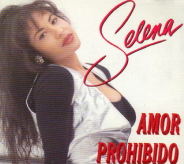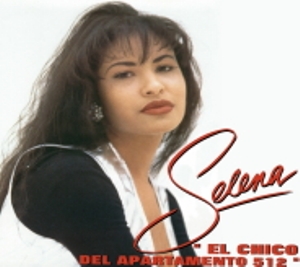Films and television
- Amor prohibido (film), a 1958 film by Luis César Amadori
- Amor prohibido, a 1944 film directed by Arcady Boytler
- Amor prohibido (TV series), 1979 Televisa telenovela
Amor Prohibido is a 1994 album by Selena.
Amor prohibido (Forbidden love) may also refer to:

Selena Quintanilla-Pérez was an American singer. Referred to as the "Queen of Tejano music", her contributions to music and fashion made her one of the most celebrated Mexican-American entertainers of the late 20th century. In 2020 Billboard magazine put her in third place on their list of "Greatest Latino Artists of All Time", based on both Latin albums and Latin songs chart. Media outlets called her the "Tejano Madonna" for her clothing choices. She also ranks among the most influential Latin artists of all time and is credited for catapulting the Tejano genre into the mainstream market.

Amor Prohibido is the fourth studio album by American singer Selena, released on March 13, 1994, by EMI Latin. Having reached a core fan base, the label aimed to broaden her appeal with the next studio release. Finding it challenging to write a follow-up hit after "Como la Flor" (1992), Selena's brother A. B. Quintanilla enlisted the assistance from band members Ricky Vela and Pete Astudillo with writing the album's songs. The resulting album has a more mature sound featuring experimental production that blends diverse musical styles from ranchera to hip-hop music. Amor Prohibido is a Tejano cumbia album modernized with a synthesizer-rich delivery using a minimalist style that was quintessential in early 1990s Tejano music.

Live! or Selena Live! is a live album by American Tejano pop singer Selena, which was released on May 4, 1993 by EMI Latin. The album was re-released on September 22, 2002 as being part of the Selena: 20 Years of Music collection; which included spoken liner notes by her family, friends and her former band members Selena y Los Dinos. Live! includes three cumbia-influenced studio tracks, while the rest of the album consists of live versions of previously released songs. The album was recorded during a free concert at the Memorial Coliseum in Corpus Christi, Texas, on February 7, 1993. It was certified gold by the Recording Industry Association of America in its first year, double platinum in 1995, and gold (standard) in 2002.
American singer Selena released five studio albums, three live albums, three boxsets, two remix albums, two soundtrack albums, and twenty compilation albums. Credited for elevating a music genre into the mainstream market, Selena remains the best-selling Tejano recording artist whose posthumous releases continue to outsell those of living musicians. Selena has sold 18 million units worldwide, making her one of the best-selling artists in Latin music. She was named the top-selling Latin artist of the 1990s decade by Billboard magazine.

Ones is a compilation album by American singer Selena, released in the United States on October 1, 2002 by EMI Latin. It was released on November 11, 2002 in Spanish-speaking countries, while the limited edition included a bonus DVD of her music videos. Ones was released building on the popularity of the 1997 biographical film Selena. The album was aimed at Selena's new generation of fans, and its release marked the singer's twentieth year in the music industry. Ones features six number one singles namely, "Amor Prohibido", "Bidi Bidi Bom Bom", "No Me Queda Más", "Fotos y Recuerdos", and her duets with Álvaro Torres on "Buenos Amigos" and the Barrio Boyzz on "Donde Quiera Que Estés".

Momentos Intimos is a greatest hits album by Mexican-American Tejano singer Selena, released in 2004. The album includes a short story from Selena's husband, Chris Pérez, about the song "Puede Ser" that was Selena's final recording from March 17, 1995.

"No Me Queda Más" is a song by American singer Selena on her fourth studio album, Amor Prohibido. It was released as the third single from the album in October 1994 by EMI Latin. "No Me Queda Más" was written by Ricky Vela, and production was handled by Selena's brother A.B. Quintanilla. A downtempo mariachi and pop ballad, "No Me Queda Más" portrays the ranchera storyline of a woman in agony after the end of a relationship. Its lyrics express an unrequited love, the singer wishing the best for her former lover and his new partner.

"Fotos y Recuerdos" is a song recorded by American recording artist Selena for her fourth studio album, Amor Prohibido (1994). It was released by EMI Latin in January 1995, as the fourth single. A cover version of the Pretenders' 1983 single "Back on the Chain Gang", "Fotos y Recuerdos" was written by Chrissie Hynde with Spanish-language lyrics by Ricky Vela. Lyrically, the song describes a lonely female protagonist who "kisses the photo of her [lover] each night before falling asleep."

"Bidi Bidi Bom Bom" is a song recorded by American Tejano singer, Selena. It was released as the second single from her fourth studio album, Amor Prohibido (1994). Originally written about a cheerful fish swimming freely in the ocean, the song's title is an onomatopoeic phrase suggesting the palpitating heartbeat of a person lovestruck by the object of their affection. "Bidi Bidi Bom Bom" was written by Selena and her backup vocalist and dancer Pete Astudillo.

"Techno Cumbia" is a song recorded by American singer Selena for her fourth studio album, Amor Prohibido (1994). It was posthumously released as the b-side track to "Dreaming of You" through EMI Latin on August 14, 1995. "Techno Cumbia" was written by Pete Astudillo and co-written and produced by Selena's brother-producer A.B. Quintanilla. The song is a dance-pop and tecnocumbia recording with influences of dancehall, rap, Latin dance, and club music. Lyrically, Selena calls on people to dance her new style the "techno cumbia" and calls out those who cannot dance.

"Amor Prohibido" is the title song of American Tejano singer Selena's fourth studio album of the same name (1994). Released as the lead single through EMI Latin on April 13, 1994, it was written by Selena, her brother and music producer A.B. Quintanilla, and her band's backup vocalist Pete Astudillo. "Amor Prohibido"'s lyrical themes have been analyzed by authors, musicologists, and journalists, who found them relevant to issues facing the LGBT community. A popular interpretation compares it to Romeo and Juliet.

Through the Years / A Traves de los Años is a collection of Selena's greatest hits. It was released on April 3, 2007. It comes as a CD/DVD set that includes Selena's songs, unreleased performances, and also an unreleased track titled "Feelings" recorded when she was 7 years old. The album peaked at number 28 on the Latin Album Chart and was certified Gold.

"Si Una Vez" is a song recorded by American recording artist Selena for her fourth studio album, Amor Prohibido (1994). It was written by Pete Astudillo and produced by Selena's brother-producer A.B. Quintanilla. "Si Una Vez" is a mariachi fusion song and draws influence from cumbia and Latin dance music. Lyrically, Selena questions why she ever fell in love with an abusive partner, saying she will never repeat her mistakes. The lyrics suggest unrequited love and female empowerment.

"El Chico del Apartamento 512" is a song recorded by American recording artist Selena for her fourth studio album, Amor Prohibido (1994). It was released along with "Fotos y Recuerdos" in January 1995, serving as its B-side track. Written by Ricky Vela, "El Chico del Apartamento 512" is a cumbia song with influences of Colombian and South American music. Lyrically, the song describes a female protagonist who knocks on her love interest's apartment door and is heartbroken when his sister answers it. Justino Aguilar of Billboard magazine, called "El Chico del Apartamento 512" as one of Selena's "most memorable songs". The track posthumously peaked at number one on the U.S. Billboard Regional Mexican Digital Songs chart in 2011.

"Donde Quiera Que Estés" is a duet recorded by American Latin pop quintet the Barrio Boyzz and American Tejano singer Selena. Released on the Barrio Boyzz' album of the same name, "Donde Quiera Que Estés" was written by K. C. Porter, Miguel Flores, Desmond Child, and produced by A.B. Quintanilla III, Domingo Padilla and Bebu Silvetti. The lyrics explore feelings felt after a breakup between first-time lovers who hope that their love will one day return. "Donde Quiera Que Estés" is a dance pop song with influences from hip-hop music.

La Leyenda is the name of the third box set from the Tejano pop singer Selena that was released by Capitol Latin/EMI and Q-Productions labels. The album was released on March 9, 2010. This box set was released in three formats: a four-disc box set, a two-disc special-edition album, and a single-disc album. According to Suzette Quintanilla's YouTube video, EMI teamed up with Q-Productions to release this box set, and Quintanilla asks Selena fans around the world to contribute a special message to Selena that may or may not be included in the new box set. The Box-sets will contain an exclusive "Selena" charm and four booklets that include messages from Selena's family, friends, and fans from around the world. Selena fans around the world were told to collaborate pictures of themselves to be part of the La Leyenda bound books, but in early February 2010, Q-Productions and Capitol Latin decided to cancel the transaction due to legal actions with copyrighted images from fans.
American singer Selena released twenty-four official singles, seven promotional singles. Her career began as the lead vocalist of Los Dinos in 1980. Her albums with Los Dinos on indie labels failed to achieve any chart success. In 1987, her remake of Ritchie Valens' "La Bamba" peaked at number 19 on the United States Billboard Hot Latin Songs chart, her first entry. She signed with EMI Latin nine years later as a solo artist though her band continued to tour with her. Selena appeared on "Buenos Amigos" with Salvadoran singer Álvaro Torres. The track peaked at number one on the U.S. Hot Latin Songs chart in 1991, the singer's first number one song. Subsequent singles, "Baila Esta Cumbia" and "Como la Flor", became popular songs on Mexican radio, with "Como la Flor" launching the singer's career in that country. "Como la Flor" peaked at number six on the Hot Latin Songs chart, despite popular culture claims that it was the singer's first number one single. The track has charted on the U.S. Regional Mexican Digital Songs list since its inception in 2010 and remains the singer's signature number and most popular recording.

Enamorada de Ti is the second remix album by American Tejano singer Selena. It was released posthumously on 3 April 2012 through Capitol Latin and Q-Productions. Enamorada de Ti was produced by Sergio Lopes, Leslie Ahrens, Andres Castro, Moggie Canazio, Cesar Lemons and Chilean record producer Humberto Gatica. Gatica had the idea of modernizing songs recorded by Selena into today's popular music genres. Selena's family had already been working on a similar idea, but they set it aside in favor of Enamorada de Ti, which had gained the approval of Capitol Latin. The selection of artists to sing duets with Selena began in late summer 2011. Gatica and Selena's family chose American singer and actress Selena Gomez, Puerto Rican singer Don Omar, Samuel "Samo" Parra from the Mexican rock band Camila, Mexican singer Cristian Castro, Spanish DJ mixer Juan Magan, and the Carlos Santana band, while the remaining songs selected were remixed.

Abraham Isaac Quintanilla III, known professionally as A. B. Quintanilla III or A. B. Quintanilla, is an American record producer, songwriter and musician, and the older brother of singer Selena, known as "The Queen of Tejano music".